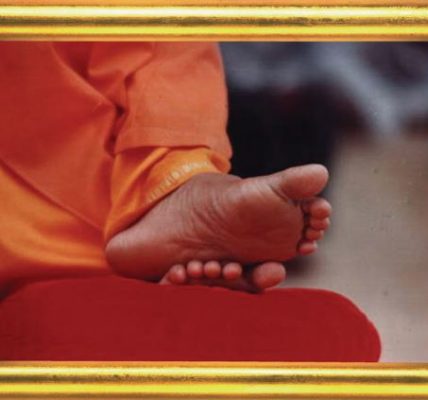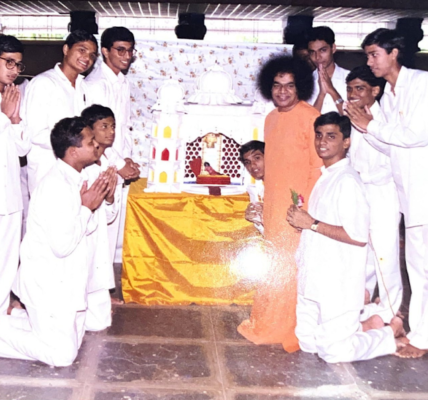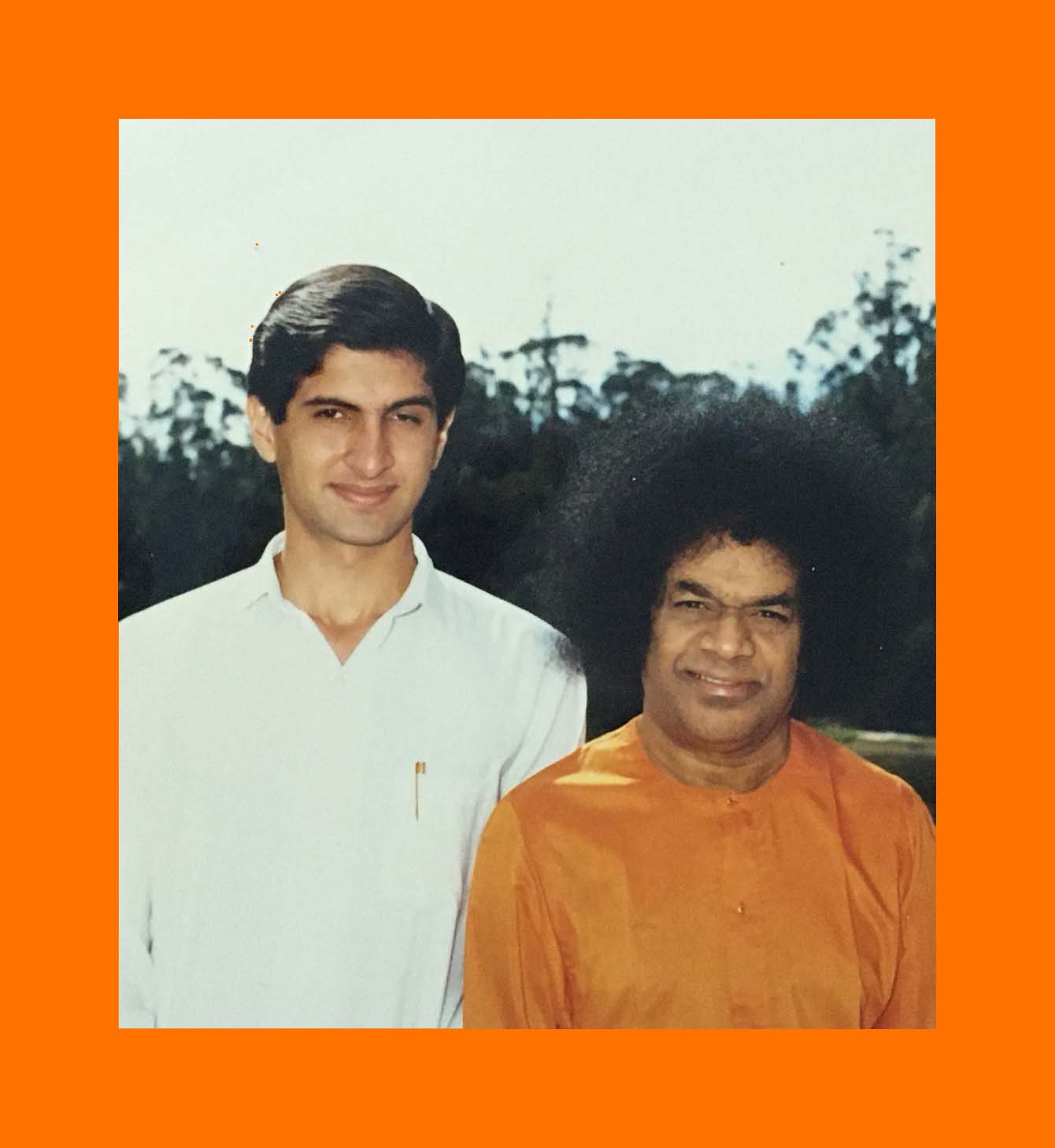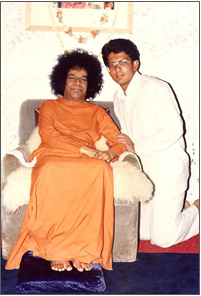Rajesh Krishnamoorthy
1991 – 1996, MBA Finance
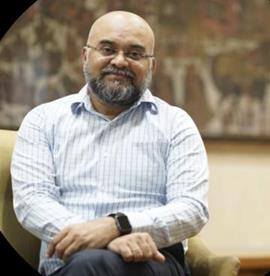
Brother Rajesh is the Head of Retail Credit, Risk, and Collections at IDFC First Bank, Mumbai. A native of Palakkad, Kerala, he joined the Brindavan campus for his B.Com., graduating in 1994. He then completed his MBA at the Prashanti Nilayam campus in 1996. He came from a humble background, having lost his father at the age of seven.
His grandfather supported the family and was a formative influence in his early years. His aunt’s family was close to Swami, and on His instructions, they moved to Prashanti Nilayam, where Rajesh’s uncle served in the Institute’s administration. Limited financial resources meant that he studied through Class XII on a state scholarship for underprivileged students. It was his aunt who then suggested he apply to the B.Com. program at Bhagawan’s institution.
He vividly recalls his first day at the college after the summer course. Ruchir Sir administered a basic accounting test to gauge the new students’ abilities. Lacking a strong foundation in the subject, Rajesh fared poorly. When submitting his paper, he candidly admitted to Ruchir Sir that he had not done well but was determined to improve with guidance. This courage to face difficulties head-on has always served him well. Ruchir Sir asked him to get the textbook from the library and meet him during evening study hours. There, Sir patiently helped him grasp the fundamentals. He remains deeply grateful to this day for that mentorship, which gave him the confidence to succeed. In hindsight, he sees that the courage to ask for help was the turning point in his academic journey and has remained a guidepost throughout his career.
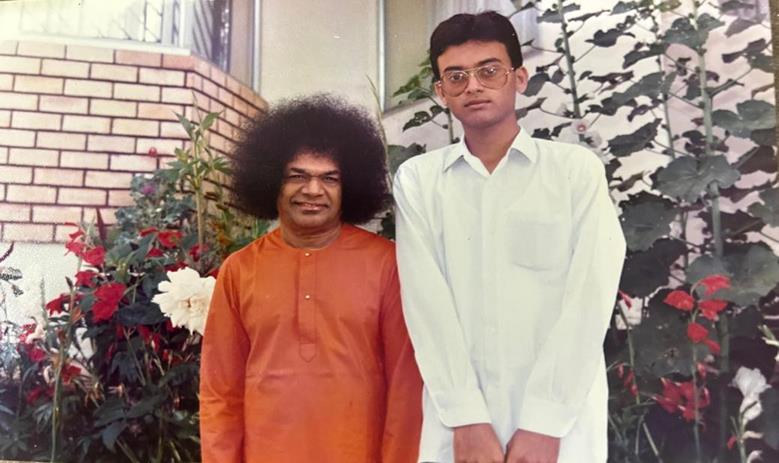
Instilled with discipline by his grandfather, hard work came naturally to Rajesh. He had learned practical self-service skills like masonry and carpentry in his early years in Palakkad. In the hostel, he would rise at 4 a.m. to study accounting and do his own laundry, a service from the hostel dhobi being a luxury he could not afford. His diligence paid off: not only did he stand second in his class that first semester, but he was also blessed by Bhagawan with the coveted trip to Kodaikanal. As part of his self-service duties, he spent his mornings in the college library, dusting and cataloging books. The simple joy of ‘Mundu’ cricket, played with his classmates, was his release. His one regret, however, is not having taken fuller advantage of the campus’s outstanding sports infrastructure by focusing on a particular sport. Rajesh believes that the discipline of the Brindavan campus, combined with the support of teachers like Ruchir Sir, Nandgopal Sir, and Rajkumar Jain Sir, truly shaped him into the professional he is today. He lives by the belief that there is no substitute for hard work and that one must be almost paranoid in their dedication to quality. Swami’s teachings of Trikarna Shuddhi (unity in thought, word, and deed) and the principle of not hurting anyone have stayed with him. While broader concepts like karma and rebirth can seem spiritually intense, the simple tenet of not hurting others in word or action is something he has deeply inculcated into his professional and personal life. Rajesh carries a profound gratitude for the education system created by Swami, without which he would have struggled to complete his education and build a stellar career. In the 1990s, placements took time. Through the help of an alumnus, brother Gurumurthy, he secured his first job with a salary of five thousand rupees. Accordingly, serving society and the Institute comes naturally to him.
Service to Society
Rajesh is passionate about the education of girls, believing that to educate a girl is to ensure her entire future generation remains educated. Alongside his classmates from the 1996 batch, he contributes to this cause in and around Chennai—a seva activity ably led and coordinated by his classmate, brother D. Nagaswamy. Given his deep attachment to his alma mater, he also contributes to the placement efforts for graduating students.
Advice to Youngsters
Life, he notes, will always demand that you make tough decisions. Early in his career, he faced a choice between two job offers: one in Pune, where his sister lived, and another in Delhi. Being from South India, his Hindi was average, and the Delhi job paid 10% less. However, the role offered a greater challenge and a higher quality of work. Rajesh found the courage to follow his gut, choosing the challenging path over the comfortable one. He was confident his hard work would see him through, and he excelled in the role.
He advises that while it is good to have a pleasing personality, one’s focus should be on contributing to the organization, not on managing perceptions. For instance, when he joined an organization whose value system was flawed, he knew he could not stay. For him, a career is a marathon spanning more than three decades. Growth, he advises, may not always be vertical. He encourages looking for growth in one’s work profile and functional responsibilities—this is what he calls building a ‘body of work.’ Today, he leads a team of about five thousand people across credit, collections, and risk. His mantra is to continuously add new profiles and roles to one’s repertoire. When he interviews senior candidates, he looks beyond their background or designation, focusing instead on what they have handled, gained, and achieved. “Don’t chase salary; chase the body of work,” he says. He explains that when you focus on this, by the 10-15-year mark, the opportunities become significant and the remuneration immense. You leapfrog. He acknowledges that the current generation faces unique challenges with the distractions of gadgets and social media. Still, he advises that at the age of twenty-two, graduates shouldn’t prioritize comfort and balance. While each generation is naturally smarter than the last due to improving education and information access, he stresses the importance of holding onto the enduring values of Indian culture and spirituality taught at the Sri Sathya Sai Institute of Higher Learning.

